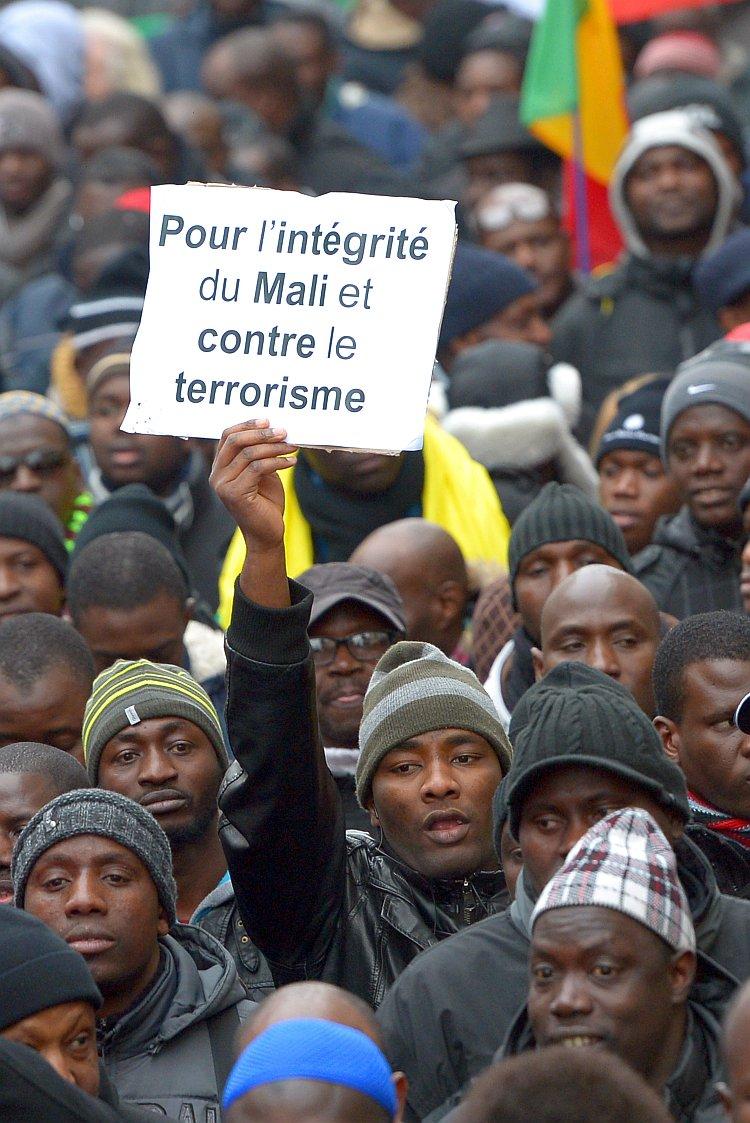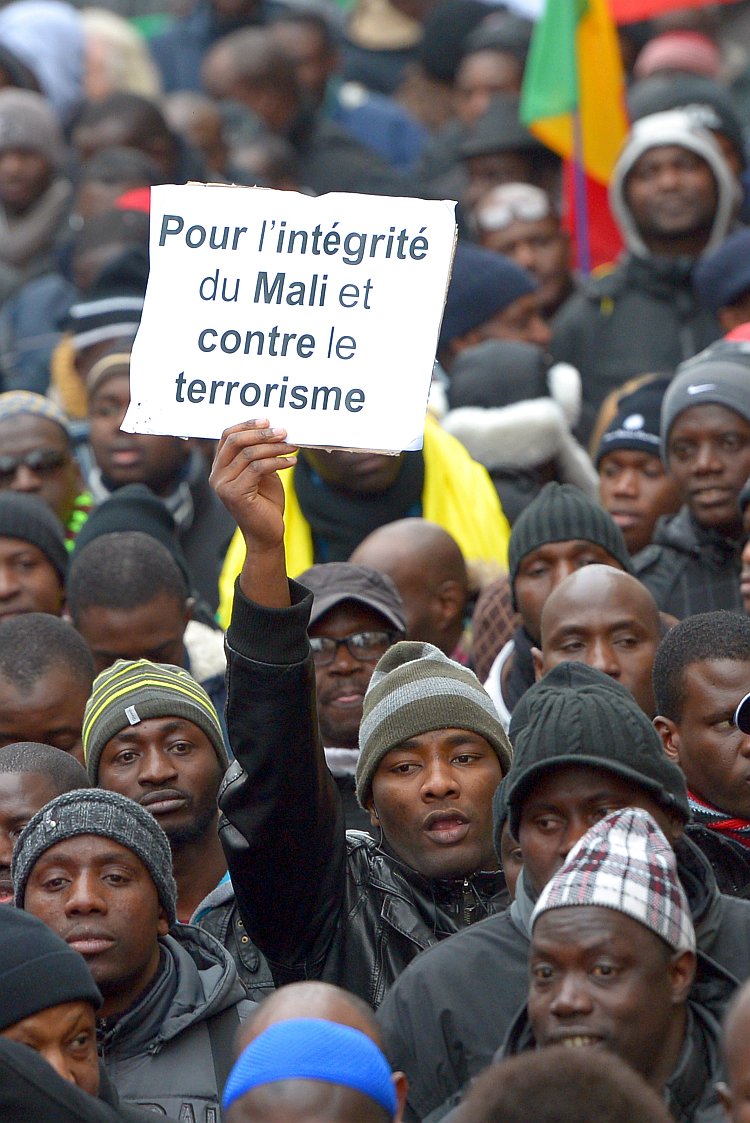NEWS ANALYSIS
The French-led forces in Mali have reclaimed most major cities in the north from the clutch of rebels and jihadists, and the terrorized population can breathe freely after 10 months of violent occupation. In the respite from immediate danger, however, the West African nation must now face the long-term process of recovery.
Mali must find an ultimate solution to its long-standing issues—and it won’t be found on the battleground. The solution rests on a credible political process.
“The long-term solution for Mali is a political settlement which requires a credible government in Bamako [Mali’s capital] that addresses northern grievances,” said John Campbell, a senior fellow at the Council on Foreign Relations in New York.
Such a process, according to Campbell, will temper the desire for greater autonomy in the north and will foster the aspiration for economic development. Moreover, a diplomatic approach to northern Mali could detach the more moderate elements from the radical groups.
There are signs that this process is already underway.
Last week, after two weeks of military intervention, one of the country’s rebel groups, Ansar Dine, split in two. The new offshoot announced its readiness for peace talks.
But, as the French-led troops step up attacks from Gao to Timbuktu, the more radical terrorists (including al-Qaeda in the Islamic Maghreb, the Movement for Unity and Jihad in West Africa, and the separatist ethnic group Tuareg National Movement for Liberation of Azawad) will simply withdraw into the Sahara, where it will be nearly impossible to destroy them militarily.
Mariya Gabriel, a member of the European Parliament and a member of the EU delegation to Africa, commented on the military disadvantage French or other intervention forces could face.
“I am afraid [rebel groups] will transform their strategy into the guerrilla one: engaging not in a direct conflict, … but taking advantage of the unexpected attack,” Gabriel said. “This is what we saw in Iraq and Afghanistan. … If they take this path, this is not our strong side.”
France was the first to reply to the SOS calls of Malian interim President Dioncounda Traoré. The swiftness of France’s response surprised many; Opération Serval deployed a military offensive on land and in the air, mobilizing 2,500 soldiers.
The Economic Community of West African States (ECOWAS), of which Mali is a member, has pledged 5,000 land forces. Chad, which is not a member of ECOWAS, has promised 2,000 troops. The United States has also supported the operation by providing refueling facilities for France’s military aircraft.
Last month, the United Nations Security Council authorized the deployment of an African-led International Support Mission in Mali (AFISMA), for an initial period of one year, to assist the government in recovering rebel-held regions in the north and restoring the unity of the country.
During the African Union summit in Addis Ababa, Ethiopia, last weekend, the U.N. Secretary-General Ban Ki-moon encouraged the Malian authorities to “embrace a comprehensive political process, and agree on a road map leading to full restoration of constitutional order.”
A Coalition of Opposing Forces
Rebuilding the authority of the presidency could be important as the country re-establishes stability, according to an article in the publication Africa Confidential. Africa Confidential also noted that interim President Traoré will need to initiate an inclusive consultation session to draw the future political road map.
Traoré has his supporters, but so does junta leader Capt. Amadou Sanogo, who organized the coup last March that sparked the conflict. Sanogo is now on the defensive after being vocally opposed to international military intervention.
Now the only successful formula for Bamako is a clear political road map and a broad coalition, which includes all actors on the scene, both civil and military. If a group is excluded, it could be taken as provocation. Forming a broad coalition out of divergent political forces will not be easy.
Malian scholar Mohomodou Houssouba wrote in an email to The Epoch Times, “At the moment, the aversion is great … the simple mention of future negotiations invariably leads to sustained tirades against their leaders, spokespersons, putative foreign sympathizers, and supporters.”
Houssouba lives in Switzerland, but is in regular contact with relatives at home. Despite this perceived “aversion” to negotiations, Houssouba also sees a positive attitude among Malians.
Positive Outlook on the Long Road Ahead
“Malians believe that the worst part of the ‘long national nightmare’ is about to end. Hard work ahead, to be sure. But at least a dynamic process [is in motion] away from the eternal paralysis imposed by the junta,” Houssouba wrote.
Diarra Abdoulaye, a Malian blogger based in Paris, is following the developments in his homeland and is also positive about the way ahead.
“The crisis in Mali should be solved through politics, and therefore with credible elections, without forgetting the return of IDPs [Internally Displaced Persons] and refugees to their place of living,” Diarra commented via email.
“The intervention will therefore allow entering the traditional political process of electing the President and the election of deputies.”
It could take a long time for Mali to overcome its challenges, said Codrin Stefan Arsene, an anthropologist and political commentator trained at the University of Chicago.
“We all want peace and stability for the people of Mali, their right to determine their own faith and to have the opportunity to develop and prosper,” Arsene wrote in an email.
“Unfortunately, nobody is ever going to pick up the tab to make it happen,” Arsene continued. “North Mali will continue to be a conflict ridden area for decades to come. If 50 years of violence could have simply been wiped out by the use of a magic wand, don’t you think someone else would have done it before France? That’s a question [French President François] Hollande forgot to ask himself.”
The Epoch Times publishes in 35 countries and in 21 languages. Subscribe to our e-newsletter.







